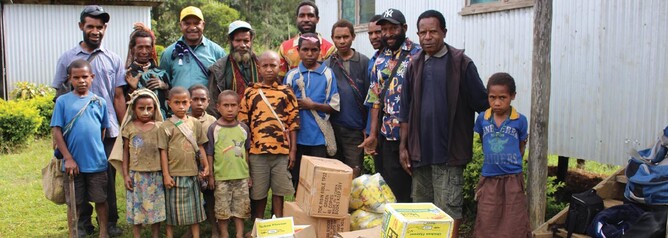We are fragile people living on a fragile planet. Tsunamis, bush fires, floods, droughts, deaths and earthquakes are reminders that we don’t have everything under control in our natural world. We think we are the lords of the earth, but the weakness of our perverse humanity undermines mankind’s achievements in every area of life, be it technology, science, construction, medicine, education or politics.
Come with me to Papua New Guinea. You will quickly understand the limitations, weaknesses and hopelessness which have us shaking our heads while, with exclamation, we give voice to our frustrations.
At 3:36 am on Monday, 26 February, an earthquake measuring 7.6 on the Richter scale furiously jolted the population living in the mountain ranges of western Papua New Guinea. People woke to feel their world reeling and rocking. Like staggering drunks they tried to stand and get out of houses which were swaying and collapsing around them. In solid darkness mums were reaching for screaming children, but their voices were drowned by the roar of the earth’s mad dance as in some places the mountains crumbled around them.
Terrified people grasped, hugged and clung to moving posts, trees and clumps of elephant grass as their bodies and legs were whipped from side to side. When the violent movement stopped, through the heavy rumble of limestone mountains breaking up and sliding in to the valleys, the voices and crying of panicked people trying to locate family members were punctuated by the loud prayers of people calling, “God help me!”
Some people were engulfed in landslides, never to be seen again. In some places mountain gardens were destroyed, rivers dammed, roads broken, and infrastructure left in chaos. An English word has now entered the lingua franca, ‘unbalanced’. Over a large area near the epicentre, bush houses that weren’t flattened were left ‘unbalanced’. Many western-style buildings, constructed for schools, health clinics and government offices, were shaken off their piles and now sit on the ground, ‘unbalanced’.
The first question of many of God’s people living through the large area was, “Is this the return of Jesus?” While it was still dark and at the prompting of Monica, a women’s leader, the women in her house scrambled to dress in their best clothing, thinking they best be ready to go heaven any moment.
As you might expect among any ethnic group the questions came: Is this demonic activity? What sins have we done to cause this calamity? Is this God’s revenge for our tribal fights? Has this been caused by mining activities and the extraction
of gas? Is this a wake-up call for corrupt politicians? There are anecdotes of premonitions and the visitation of angels by some. But the lessons we have sought to teach are: indeed earthquakes will precede the coming of the Lord (Matt 24:7); we do live on a fragile planet which has a use by date (2 Peter 3:10-13); we don’t have everything under our control (Heb 1:3, Col 1:17); but in our weakness and fragility the sovereign God is our refuge and strength even when the mountains crumble (Psa 46:1-3), and indeed the earthquake has been an awesome display of God’s power in nature.
My visit to the area was not planned, but being occasioned by the earthquake I have had many ‘divine appointments’. I have visited many people over the large area where there are Brethren Assemblies. We distributed 2100 kg (5250 packets) of nails, 100 hammers, and 12 rolls of builder’s plastic to more than 600 families to help in the reconstruction of their simple homes.
One trip took me to Kelabo. Jonnie, my co-worker in the area, came at 5:30 pm. It had been an overcast day and rain clouds were threatening in the direction we were to travel. On the deck of the Landcruiser was a load of relief supplies for the communities at Kelabo and Arou, old mission stations. We carried nails, Bibles, noodles, rice, hammers, literature and tinned fish under an old tarpaulin. On top of the tarpaulin were a few people taking the opportunity to travel home. Minape, another co-worker, came along to help us. This was to be a trip never to be forgotten and hopefully never to be repeated.
When we were less than an hour into the trip, darkness fell early because of the black clouds and a heavy storm was brewing. Jonnie had paid good money in Mt Hagen to have the lights on his car fixed, but he quickly found out that his money had been wasted. As we went up and through the mountains, we discovered that one light was pointing diagonally up into the trees and reflecting brightly off the clouds that enveloped the road — useless and sometimes blinding us. The altitude is 1800 meters (6000 feet ASL). I had the luxury of sitting in the cab while those on the back were soaked and cold, trying vainly to shelter with the nails and noodles under the corner of the tarpaulin.
The mountain road winds above the Tumbudu valley with steep drops to the valley below.
On this trip our eyes focussed on the road ahead, peering through the murk to spot the cracks and steps caused by the earthquake. Our lives were at stake and our speed was reduced to a crawl. I only had to pray and look. Jonnie was praying, looking and driving. Consternation and tension escalated when the rainstorm became a violent thunderstorm. White lightning flashes were followed instantly by deafening thunder claps which continued to rumble
around us. For a few seconds the brightness of the lightning made the road ahead invisible while our eyes readjusted. While frightening to the people on the deck of the Landcruiser, I was vividly reminded of John Bunyan’s story when Pilgrim faced the fierce attack by Satan as the fiery darts of the devil were flung at him, to be quenched and cast aside by the shield of faith. Minape said that it was like being followed by a man with a gun who was shooting us and tipping buckets of water over us.
For more than an hour the storm tracked us until within two kilometres of Kelabo Christian Centre. Just short of the station we stopped to greet two of God’s beautiful women, nurses walking through the deluge, going up to the clinic to help a lady in labour. On arrival people came out of the darkness to quickly unload the vehicle. We were escorted to a warm, dry, smoky house where Paliago and his wife Dorcas stoked the fire to warm and dry our saturated passengers. In such houses I always sit by the door. I have a nickname known by the people here, ‘Smoke Magnet’. When I sit in their houses, the smoke singles me out and makes my eyes water.
Our mission at Kelabo was to bring to the people affected by the earthquake tangible expression of the love of God and to encourage them by our presence. We are just ordinary people, but our arrival through the storm at that time of night was, to the people, unexpected and amazing. The visit was surely used by God in ways we did not expect — and the Devil hates such activity by God’s people!
I am at Guala writing this. I am two hours on a slow road from Tari, the provincial capital, which for the last week has been wracked by tribal fighting between two coalitions of clans.
The antagonists have forgotten the agony of the earthquake and continue to terrorise innocent people with indiscriminate murder, violence and house-burning. In one day seven people, unrelated to the clans, were killed in Tari town by men scouring the town with high-powered military weapons, looking for victims. Some of them were students. Yesterday, speaking to a friend who works for an airline, I asked him, “How are you today Edward?” He said, “We are living in fear.” He has sent his family away, but for work purposes he has stayed behind. He confirmed that the airstrip is closed and therefore I need to find alternate transport to get out of the area. It will probably mean an eight-hour trip by road, with the first part of the journey in a convoy of vehicles.
While the current problems at Tari are an escalation, the problem of revenge killing, payback, is rooted deep in the culture of the Huli people. When Australian patrol officers pacified the area in the 1950s, a medico accompanied the patrols. The doctor was kept busy doing surgery to backsides and limbs, removing bones and pieces of hardwood which had tipped the spears used in traditional tribal fights. What was traditional has taken on new dimensions with the use of home-made firearms and smuggled or stolen military weapons. In this new age, now women can become victims because they are seen to involve themselves with smuggling weapons
and cartridges.
The Christian people stand apart from this violence, although they are implicated because of their clan relationships. A young Christian man will be pressured to join in hunting for victims to kill. If they refuse they will be accused of being effeminate cowards. The truth is that only the real men, God’s men, can withstand such pressure. There are many examples here of Christian men standing against the culture and standing for righteousness. Jonnie had a finger chopped off by a brother. While nursing his chopped finger he was given a machete to kill his brother, but there was no payback. Moses’ brother was killed. As a brother, he was told to lead the clan in avenging this death. He stood against the pressure — again, no payback.
These men become respected by their clans, but they can still become a victim to an enemy. For this reason people in the area avoid travel on the roads, and activities by the churches are restricted.
On another mercy supply trip up the Pori valley, we passed a large group of men armed with home-made guns. And then further up the road, between Tade and Pori, was the disturbing sight and smell of a corrugated tin coffin standing on posts three meters above the ground.
Two weeks prior to our trip an innocent old man, walking down the road and minding his own business, was killed by a hunting party. The non-Christian relatives, incensed by this murder, decided not to payback but, as a protest, they have left his body to decompose in this elevated and aerated coffin.
Talking about this with the local Christians has caused us to think, “What can we do about this violent return to the old culture?” The people around us call for a strong government presence with police and the army. Some are calling for the introduction of capital punishment. But for the Christians, indeed, what can we do? Our resources are limited to the example of the Lord Jesus and the word of the LORD, and the power of the gospel which can change lives. This is not weakness, it is strength. We are human, but we don’t wage war as humans do. We use God’s mighty weapons, not worldly weapons, to knock down the strongholds of human reasoning and to destroy false arguments. We destroy every proud obstacle that keeps people from knowing God. We capture their rebellious thoughts and teach them to obey Christ (2 Corinthians 10:3-5 NLT). The example of the Lord Jesus teaches us to turn the other cheek and let the aggressor finish the job, or to walk the extra kilometre.
The word of the LORD says, Dear friends, never take revenge. Leave that to the righteous anger of God. For the Scriptures say, “I will take revenge; I will pay them back,” says the LORD. Instead, “If your enemies are hungry, feed them. If they are thirsty, give them something to drink. In doing this, you will heap burning coals of shame on their heads” (Romans 12:19-20 NLT).
During the last week of my March-April trip to the Hela people this has been the theme of my message. The message was first shared as a Bible study with two friends, and it was shared with others as opportunity presented itself. A short tract has been written to get the message out through the churches to the community. In the face of violence and terror the reality does not change. God’s people, whether they be in the first world or the third world, though they be a little flock in the lost world, they are the inheritors of a great kingdom (Luke 12:32).
by Les Loader


